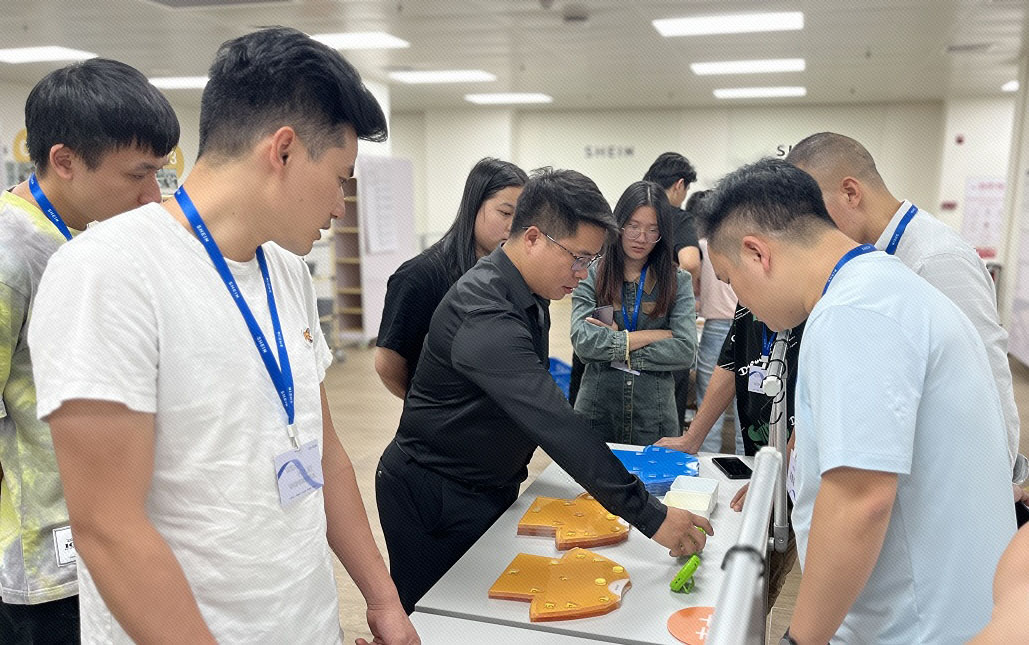Achievements across the last year move SHEIN closer towards its long-term goal of building a modern and resilient supply chain eco-system.
SHEIN’s Supplier Community Empowerment Program (SCEP) is aimed at empowering SHEIN’s ecosystem of third-party manufacturing suppliers and the workers within. In April 2023, SHEIN announced its intention to invest a total of US$70 million over a five-year period to empower and support its supplier community, with initiatives focused across facility enhancements, technology advancements, training and upskilling, and services for the community.
Technology Advancements Supported by ISO-certified Management Systems
SHEIN’s Centre of Innovation for Garment Manufacturing (CIGM) was built last year to elevate the garment manufacturing industry through research and development, establish best practices in lean and agile production and impart key learnings to SHEIN’s manufacturing suppliers to drive organizational and process transformation, with the goal of creating a modern and agile garment manufacturing eco-system. .
In November 2023, the CIGM achieved two internationally recognised certifications – the International Organisation for Standardization’s ISO 14001 Environmental Management Systems and ISO 45001 Occupational Health and Safety Management Systems. These two standards verify that the frameworks developed by SHEIN to manage and measure the environmental performance, and the occupational health and safety risks at the CIGM facility meet the ISO international requirements.
Training and Upskilling
Providing garment workers with access to training and upskilling opportunities is another aspect of SHEIN’s continued commitment towards innovation and transformation across its supply chain.
In 2023, SHEIN conducted 620 training sessions for supply chain workers, exceeding its initial target of completing 480 training sessions within the year. These sessions covered various topics, including business and operational processes, the latest technologies in garment production, certification courses focusing on quality inspections and assurance, and national vocational skill level certifications.
SHEIN has also established a training hub offering on-the-job skills training to garment industry workers, with the aim of developing a skilled workforce that will contribute towards the revitalisation of rural industries.
Facilities Enhancements
SHEIN committed an initial US$15 million to the SCEP in May 2022 to upgrade hundreds of suppliers’ facilities across its supply chain. At the end of 2023, SHEIN has modernised more than 160 suppliers’ facilities in its supply chain with facility enhancements, upgrades and expansion, transforming over 407,000 square metres (over 4.4 million square feet) of workspace.
In addition, investments have also been made in services that benefit communities within the supply chain ecosystem. In the last year, SHEIN completed the upgrading of canteens, dormitories and multi-purpose recreational spaces amounting to 10,486 square metres of space (more than 112,000 square feet) across 23 facilities.
Services for the Community
More than US$150,000 was also allocated in 2023 to launch 10 childcare centres to support workers and their families across ten facilities. The childcare centres are designed to create a family-friendly workplace environment for SHEIN’s suppliers’ workers, allowing workers’ children to play and learn, develop social skills, and participate in parent-child activities alongside their parents. Workers must apply and meet certain requirements before their children can attend the childcare centre.
Separately, SHEIN’s Spotlight programme extended support to 165 families and 297 school-aged children in 2023, providing more than US$185,000 in financial assistance for the payment of school fees and education, and the treatment of serious illnesses and incidents.
The Spotlight programme was established in July 2021, and provides financial support for families in the communities undergoing financial hardship. Since its inception, the programme has extended more than US$460,000 financial support to 385 families, including 723 school-aged children.

